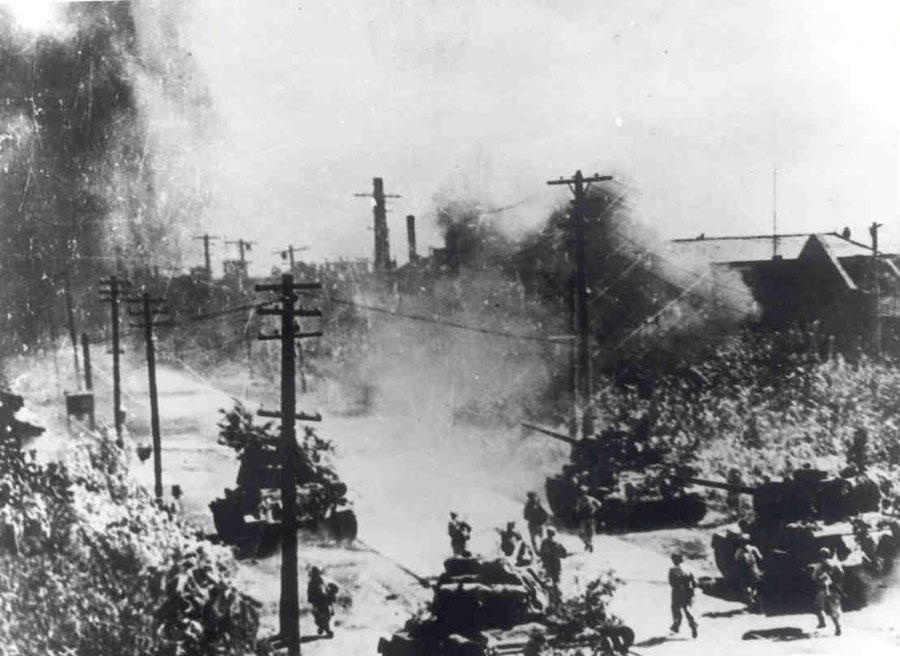
A talk with college students
Egg Fried Rice and a Thankless Wolf - Lao Yang Again on the Korean War
Jun 11,2023
by Yang Fei (in Changsha)
I was again asked by a student tonight
what I thought about the Korean War. My basic point: The 38th
Parallel was originally the internationally recognized demarcation
line between North and South Korea. It was delineated by the Allied
forces at the end of the Second World War in September 1945.
President Truman and Stalin, the supreme leader of the Soviet Union,
agreed that the Japanese troops north of the 38th Parallel surrender
to the Soviet army and those south of the 38th Parallel surrender to
the U.S. army. After WWII, North and South Korea set up separate
governments and ruled by the 38th Parallel line.
On June 25, 1950, the North Korean leader Kim Il Sung, with the
tacit approval and support of Stalin and Chairman Mao, tore up the
Allied agreement and crossed the 38th Parallel to attack Seoul, thus
triggering the Korean War.

In June 1950, North Korean tanks entered Seoul
The
question of who started the fight is crucial when it comes to
accountability for a group fight. From the files released by
multiple parties now, there is no doubt that Kim Il Sung started the
fight. North Korean textbooks portrayed the exact opposite, which is
understandable, since the Japanese used to claim that the Chinese
army attacked the Japanese army first in the Lugou Bridge incident,
and subsequently led to Japan's eight-year war of aggression against
China from 1937 to 1945.
On the eve of the outbreak of the Korean War, the North Korean army
was dominant in terms of both equipment and numbers, and was
accompanied by a large Soviet military advisory corps (from
headquarters to regiments and battalions). The North Korean People's
Army opened the way with Soviet T-34 tanks and launched a blitzkrieg
operation, taking Seoul in just three days, which shocked the world.
This speed was comparable to the German blitzkrieg on Poland in
1939. On the second day of the war, the UN Security Council passed a
resolution demanding the immediate withdrawal of North Korean troops
north of the 38th Parallel. For sure, the resolution was a piece of
junk paper for Kim Il Sung.
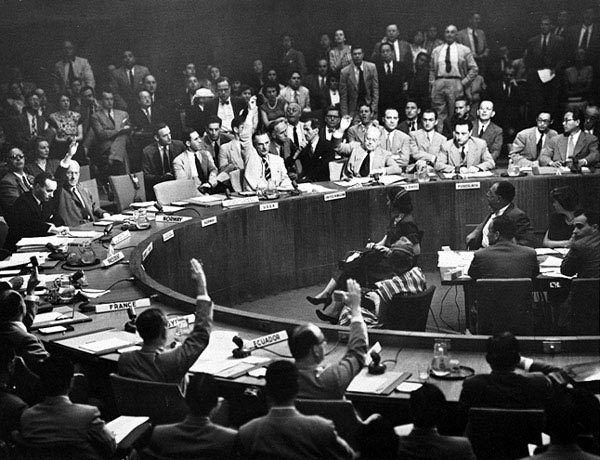
On June 27, 1950, the United Nations Security Council voted to urge North Korean troops to withdraw from South Korea, with Soviet representatives deliberately absent
The North Korean army
pushed forward triumphantly all the way, and it almost drove the South Korean
Syngman Rhee government into the sea to feed fishes. The Americans came to their
aid on a large scale at this critical point. On September 14, 1950, MacArthur
led the United Nations forces (mainly Americans) to land at Inchon, cutting off
Kim Il Sung's retreat while helping the South Korea army to start a
counterattack from the beaches of Pusan.
Under the attack of the two fronts, the North Korean army suffered a landslide
defeat. The main force of the North Korean People's Army was surrounded by the
US-South Korea coalition forces along the line from the Nakdong River to Busan.
Kim Il Sung himself fled back to Pyongyang, but the Americans did not let the
matter rest. On October 8, the US-South Korea coalition forces crossed the 38th
Parallel and continued their pursuit. On October 19, they captured Pyongyang and
then pushed right up to the Yalu River on the border with China.
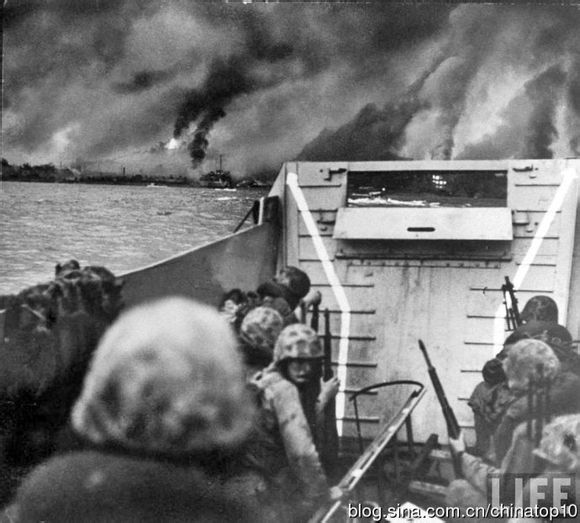
On September 14, 1950, U.S. troops landed at Inchon
When Kim Il Sung was
about to be driven into the Yalu River to feed the fishes, he urgently appealed
to Stalin of the Soviet and Chairman Mao (hereinafter referred to as Mao Zedong
or Mao) of China for help. The cunning Stalin offered to sell MiG warplanes and
DP machine guns, but he refused to send in troops (a small amount of air cover
was later given, with Soviet pilots in Chinese army uniforms). Mao Zedong
was also hesitant at first, because most members of the Central Politburo did
not agree to send troops; Veteran general Lin Biao simply pretended to be ill,
and General Su Yu even suggested that Kim Il Sung should go up to the mountains
to fight guerrilla warfare. I don't know what Mao Zedong thought in the end, he
overcame all opinions and decided to send troops directly to Korea to help Kim
Il Sung.
In the initial stage, the Chinese People's Volunteers Army (hereinafter
Volunteer Army) made relatively smooth progress, and the Yankees were forced to
retreat. The Volunteer Army successfully recaptured Pyongyang, crossed the 38th
Parallel on December 31, 1950, and occupied Seoul on January 4, 1951. The U.S.
army counterattacked and recaptured Seoul on March 15. The two sides were
trapped in tug-of-war and positional warfare, and no one could eat the other, so
they had to sit down and negotiate. An armistice agreement was finally signed on
27 July 1953. Over the past three years, the Korean peninsula had been battered
to pieces, and yet the 38th Parallel remained basically unchanged. The stupidest
war in the world is no more than that.
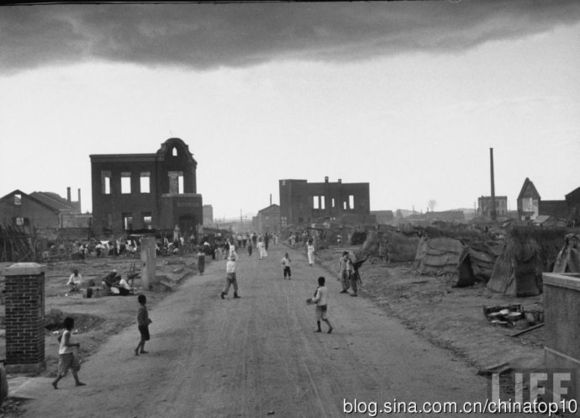
In June 1951, the city of Daejeon, South Korea, was turned into a scorched earth, with makeshift tents erected by refugees on the side of the road. Photo by Joseph Scherschel
Throughout the Korean War, the biggest loser should be the Korean
people. The compatriots killed each other; their homes were turned into scorched
earth, with millions of direct casualties. South Korean people are relatively
OK. They have pains and gains, and most of them today live a happy life. The
people of North Korea suffered the most. With so many deaths and injuries, but
up till now, many residents still do not have enough food to eat, except for the
fat Kim families.
The United States is undoubtedly one of the losers. According to the Korean War
Memorial, 36,570 American soldiers were directly killed on the battlefield and
more than 300,000 were injured. It is difficult to understand why the U.S.
military fought themselves to the bone in Korea, and it’s baffling why there was
such a war. I feel that even if the whole of Korea was lost, it would not pose
too much of a threat to the U.S. Pacific strategy, as the most important things
in the Pacific Rim have always been Japan and Taiwan.
Later I thought, maybe the United States considered that all socialist countries
are terrorist totalitarianism, and should be dealt with harshly and cracked down
mercilessly, but there was no need to do it itself, right? From the outbreak of
the Korean War on June 25, 1950 to the Incheon landing on September 14, there
were nearly three months, which was enough time to rearm the Japanese veteran
soldiers and send them to Korea to fight for their lives. The Japanese back then
were as poor as church mice, which was also a relief for them. Chiang Kai-shek
in Taiwan also said that he was willing to send troops to Korea, why not fulfil
his wish? He lost the 1946-1949 Chinese civil war but he was not convinced. Why
not let him go to Korea and fight the communist Chinese army again? All in all,
I really can't understand why President Truman must let American soldiers go to
North Korea to fight for their lives. The Yankees had a short memory and never
learned a lesson. After the Korean War, they went to Vietnam and fought again,
and suffered a greater loss without redress. Let’s not mention it here.
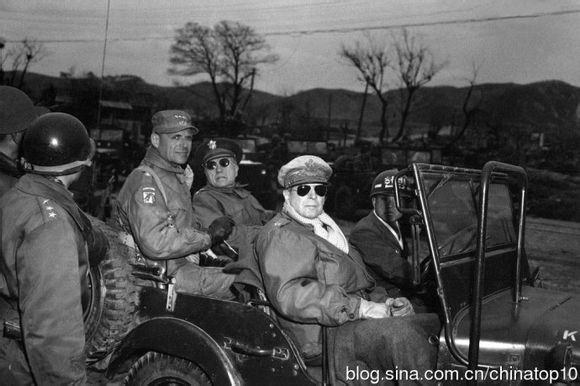
Commander of the United Nations Forces, General MacArthur and Lieutenant General Ridgway
Stalin can be called an
awful teammate in the Korean War for his horrible performance. On June 27, 1950,
the UN Security Council voted to urge North Korean troops to withdraw from South
Korea, and the Soviet representative actually abstained. When the UN Security
Council was to pass a resolution to send UN troops to the Korean Peninsula
(apparently allowing the US to legally wage a war with China), the Soviet
representative again abstained. As a permanent member of the UN Security
Council, Stalin holds a veto power, didn't he know that? I can only speculate
that Stalin wanted to deliberately set China up for injustice, so that China
would have to fall back on the Soviet Union and act as a front-line sidekick in
the fight against the United States. So, to say who the biggest winner in the
Korean War was, it was undoubtedly the Soviet Union. Stalin was unscathed,
sitting on the mountain top and watching the tigers fight, and successfully
contained the biggest opponent, the United States, so that China could only
recognize Stalin as the big brother. Economically, the Soviets made a huge
amount of money from selling its WWII decommissioned and stockpiled arms, and
China did not pay off these arms debts until 1965.
Regarding the issue of arms purchase in the Korean War, on the eve of the Lushan
Conference in April 1959, Peng Dehuai, former commander-in-chief of the Chinese
Volunteers Army, complained when leading a military delegation to the Soviet
Union and Eastern Europe, saying, "In no way did we want to fight this war
(against the U.S. and aid North Korea). We have just stood up, tens of thousands
of tons of steel, and we have not yet breathed a sigh of relief. We were forced
to fight a war we could not afford and were not very sure of! We use our heads
to fend off an opponent’s superiority in weapons. But this battlefield, planted
with countless Chinese heads, has left us with a mountain of debt. The Soviets
gave us some weapons; most of which were used and left over from World War II,
but the price was not low. They made a profit out of us and took advantage of
our shaky brother. We put up with it and said nothing, for the sake of the unity
of the internationalist family."
There is nothing wrong with internationalism. In the past, Bethune left the poor
people in his country behind and went to China to help the Eighth Route Army. We
were very grateful to him. But internationalism must have a limit. For the
benefit of the Koreans, it’s too much to sacrifice hundreds of thousands of
lives of Chinese people and spend billions of dollars that should have been
spent on domestic construction. Was this patriotic or traitorous?
(Note: Henry Norman Bethune, a Canadian surgeon, was sent by the Communist Party
of Canada in 1938 to serve as a military doctor in China to support China's War
of Resistance against Japan. In November 1939, he unfortunately died on the
front line.)
The Korean War has long been a source of official pride in China, which fought
to a draw with the United States, the world's top military power. Casualty
figures for the U.S. and Chinese troops may be somewhat disputed. According to
the Chinese Military Museum, there were 171,669 Volunteer Army martyrs. Here is
my take: with the 38th Parallel basically unchanged, it’s a tie ostensibly, but
the death toll was four or five times that of the enemy. If it was a great
victory, the logic is quite strange.
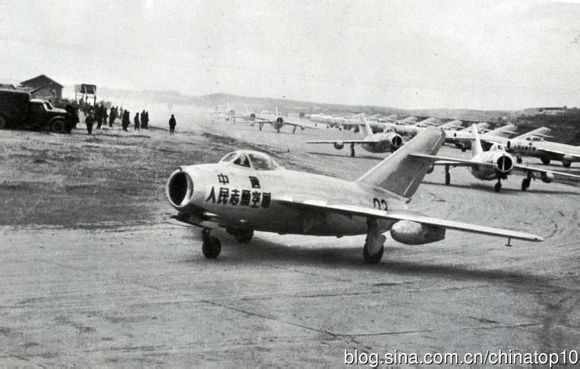
The fleet of the Chinese People's Volunteers Army air force. MiG-15 was the most advanced fighter jet in the world at that time
Some military fans may
say that it’s not a bad performance considering they had only millets and rifles
(meaning the Volunteers Army was poorly equipped). This view is wrong. The
Volunteers Army was relatively outgunned in terms of artillery and tanks, but
not in all sections. With the support of the USSR, one of the largest arms
dealers in the world, the volunteer army has long been not millets plus rifles,
but DP machine guns plus MiG warplanes. In the mid-term of the Korean War, the
MiG-15 fighter jets of the Volunteers Army Air Force repeatedly won battles and
once achieved some air superiority (please search for keywords: MiG Corridor).
To be fair here, the Russians also contributed to the Korean War directly.
According to incomplete statistics, the former Soviet Air Force lost 126 pilots,
133 non-commissioned officers and 335 aircrafts during the Korean War.
It should be noted that the MiG warplanes of the Volunteer Army were not given
for free, but were bought from the USSR by Chinese people with real money in
hard cash. All Chinese people paid for the Korean War. Below is a picture of a
MiG jet fighter that was donated to the Volunteers Army by Henan opera artist
Chang Xiang Yu on her national tour, which was a legend at the time. The whole
of China had been mobilised, money was donated, and people were conscripted. The
common people all thought that US imperialism was about to attack China.
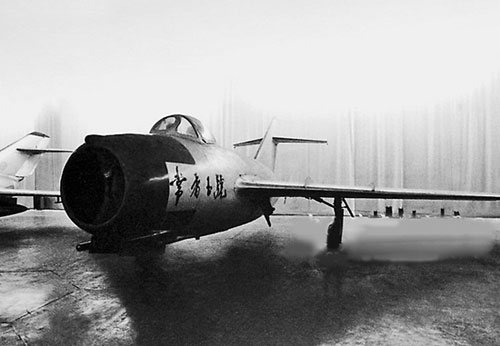

Image above: children in Qingdao city donating money to buy fighter jets for the Korean War. In my personal opinion, it is not a good thing to involve children in the war
The final question: Was the war, which cost the Chinese people so
much, worth it or not? The Chinese propaganda slogan "Resisting US
Aggression and Aiding Korea, Defending the country" has been well
known, meaning that China faced an invasion by the U.S., so it sent
troops to Korea. However, according to the declassified archives,
the U.S. had no plans whatsoever to attack or occupy China. Some say
that MacArthur had intended to do so, but there has never been any
evidence for this claim. Even if MacArthur had intended to,
President Truman would never have agreed. Moreover, the probability
for the U.S. Senate and House of Representatives to pass a
resolution to attack China is almost zero; everyone knows that it
would mean a new World War (see Sino-Soviet Treaty of Friendship and
Mutual Assistance). One of the reasons for MacArthur's abrupt
dismissal in April 1951 was that he had always been loud-mouthed,
claiming to take all necessary means (hinting at nuclear weapons)
and visiting Taiwan without authorization, repeatedly embarrassing
President Truman.
Let’s take a thousand steps back, even if the United States had
intended to attack China at that time, with the strength of the US
navy and air force, it could attack whoever it wanted and land
directly anywhere on the earth. The Normandy landings in Europe in
1944 and the Incheon landings in the Korean War are proof of this.
The Yankees had nothing better to do but attack North Korea first,
and then get into China?
The United States was so determined not to go to war with China and
the Soviet Union that it even purposely concealed its military
information. The U.S. Air Force concluded that the Soviets entered
the war directly as early as late 1950, and there were a lot of
conversations in Russian in the monitored radio. U.S. pilots even
saw the faces of white people through the windows of their cockpits.
But the United States said nothing about the Soviet Union’s direct
involvement in the Korean War at the time, because the U.S.
president, like Stalin, did not want to start World War III.
Eisenhower's top aide, Nitzschamp, had said, "If we publish the
facts, the public will expect us to act on it, and the last thing we
want to do in this war is to expand the conflict with the Soviet
Union to a greater extent."
China has long accused the U.S. military of deliberately bombing
north-eastern China. Here’s how I see the issue. To cut off Kim Il
Sung's logistical support, the U.S. military bombed the Yalu River
bridge many times. It was possible that several U.S. bombs fell on
Dandong city of China, which is right next to the Yalu River. There
were no precision-guided bombs in those days. But do you believe
that the U.S. were bombing Chinese cities systematically and
preparing to attack China? Last month, several Burmese Air Force
bombs (accidentally) fell on Chinese territory; did anyone believe
that Myanmar was preparing to attack China? As evidenced by the
picture below, although the US military repeatedly bombed the Yalu
River bridge, the pilots also deliberately avoided the Chinese side.
Those who say that the U.S. military deliberately bombed northeast
China, please show evidence.
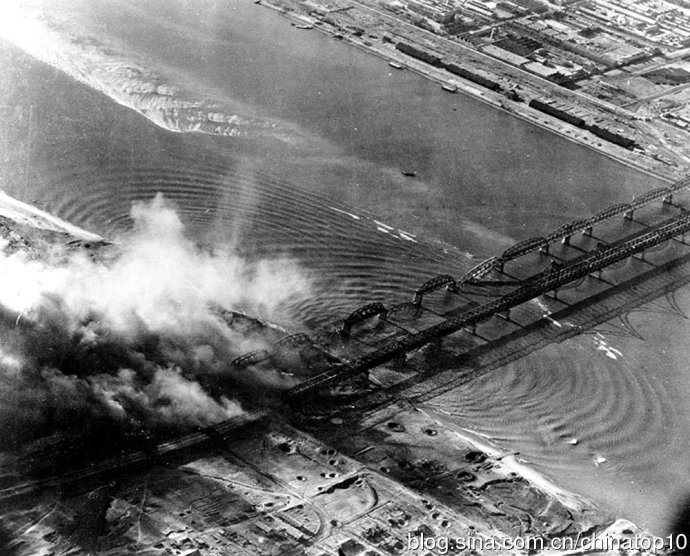
In October 1950, U.S. airstrikes blew up the Yalu River Bridge on the North Korean side
According to declassified Russian
archives of the Korean War, the Chinese repeatedly bartered with Stalin before
sending troops to North Korea, saying that if the Soviet Union did not provide
air support and weapons, China would not send troops. If your country was really
invaded by a foreign country, how can you still sit there and bargain? You have
to go to the battlefield immediately even if you have only a sword and spear on
hand.
The Chinese intervention in the Korean War was largely instigated by the cunning
actions of Kim Il-sung. It should be noted that from 1949 to early 1950, Stalin
had been reluctant to support the use of military force to unify Korea, as no
one wanted to be dragged into a small country's civil war. However, Kim Il-sung
persisted with tears, tantrums, threats of suicide, and numerous secret requests
for assistance, until he personally travelled to Moscow and secured Stalin's
support.
Stalin agreed with Kim Il Sung, but told him: you may attack South Korea, but
please consult Chairman Mao Zedong before starting the war. This was really a
smart move, not only giving Mao Zedong face, but also pushing away the
responsibility for the future (in case you fail, don't come to me, please go to
Mao Zedong). So on the eve of the attack on South Korea, on May 13, 1950, Kim Il
Sung flew to Beijing to meet Mao Zedong secretly. With the support of Stalin,
Kim Il Sung at that time was full of pride and heroism, patting his chest and
saying that there was no need for China to send troops, and he was sure of a
quick victory. Unexpectedly, he was beaten and crippled by the Americans a few
months later, and he hurriedly cried and asked China for help and support.
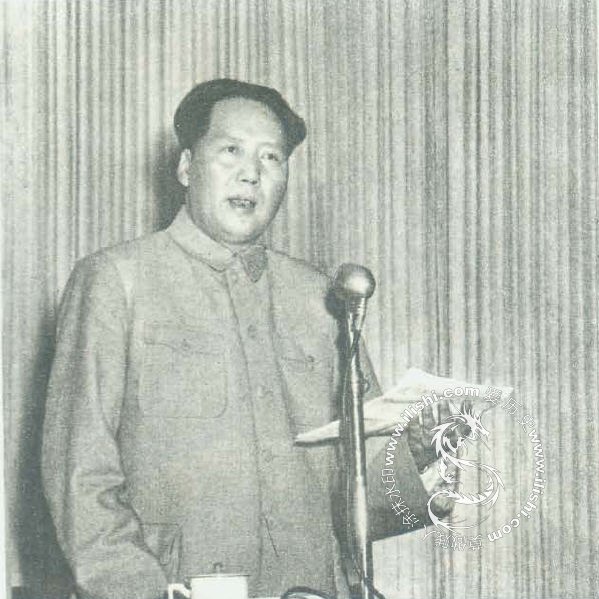
On the third day of the outbreak of the Korean War, on June 28, 1950, Mao Zedong delivered a speech, calling on the people of the whole country and the world to unite and be fully prepared to defeat any provocation by US imperialism
By the way, we are not
saying that China didn't send troops at all before the Volunteers Army entered
North Korea. We all know that at the end of 1949, Chairman Mao gave three
divisions of the People's Liberation Army (the 164th, 166th and 156th divisions
of the Fourth Field Army), a total of nearly 50,000 troops, including personnel
and equipment, to Kim Il Sung for free. These three divisions were reorganised
into the Korean People's Army and became one of the main forces attacking South
Korea. But this doesn’t not mean that Chairman Mao supported Kim Il Sung's
attack on South Korea at that time. Many of the officers and soldiers of these
three divisions were ethnic Koreans living in northeast China, and the People's
Liberation Army needed to be downsized after the three-year Chinese civil war
ended. After repeated requests from Kim Il Sung, the favour was given by
Chairman Mao. This is also his consistent style. No matter how tight the
domestic situation is, foreign aid must be generous.
There was another consequence of China's troop deployment to Korea, and that was
the complete collapse of the plan to attack Taiwan (the U.S. completely turned
against China and the U.S. Seventh Fleet moved into the Taiwan Strait). Chiang
Kai-shek was so happy that he couldn't sleep at night and cried out "Heavenly
Father, Holy Spirit" as he finally secured the island of Taiwan. It can be said
that the Korean War helped three dictators: Kim Il-Sung in North Korea, Lee
Seung-Wan in South Korea, and Chiang Kai-Shek in Taiwan.
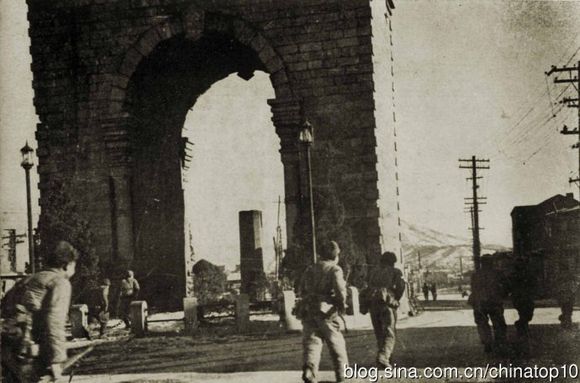
In January 1951, the Chinese army searched and advanced near the Independence Gate in Seoul
There is also a popular
narrative in China that the war saved North Korea and created an important
buffer zone for China. This is hard to believe. The territory had not been
invaded and, according to international norms, there was no justification for
military actions. If every country sent troops into a foreign country on the
pretext that they needed a buffer zone, the world would have fallen into
complete chaos and endless war fares. Therefore, although China sent a
million-strong army to Korea, it never declared war and has always called it a
volunteer army. Of course, there are cases where it is possible to go to war
directly, and that is when the two countries are allied with each other. But
China and North Korea did not have an alliance at the time (the Treaty of
Friendship and Mutual Assistance between China and North Korea was signed only
in 1961), and legally China was not obliged to send troops at that time.
For a long time, the United States was officially called the "aggressor" in the
Korean War by China, but the international community did not see it that way. As
early as February 1, 1951, the United Nations General Assembly passed Resolution
498 by a vote of 44 in favor, 7 against, and 8 abstentions, recognizing the
People's Republic of China's intervention in Korea as an act of aggression, and
calling on the People's Republic of China to cease its confrontation with the
United Nations forces and withdraw from the Korean Peninsula. The Chinese
foreign Ministry dismissed the resolution as nonsense. China was not a member of
the UN in 1951, and it is understandable that it ignored the resolution.
Many people are proud to say that the Korean War greatly improved China's
international standing. But the reality is that a Korean War left China isolated
from Western society for over twenty years. What is the logic of going to war
with UN peacekeeping forces and still improving international status? The U.S.
troop deployment to North Korea was authorised by the United Nations, with 16
countries sending troops, in addition to 41 countries providing military
equipment and supplies. Attacking UN peacekeeping forces should only be done
today by bandits from African tribes.
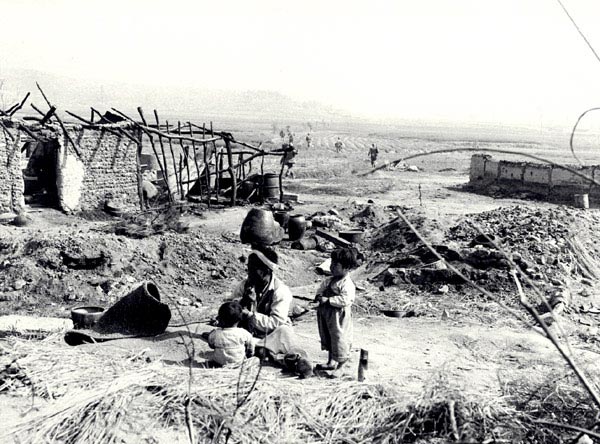
A war-torn village in North Korea in the fall of 1950, with soldiers of the U.S. Army's 1st Cavalry Division in the distance
In summary, although China had been singing high "we stride across the Yalu
River with majesty and pride", those with sharp eyes know that China's military
intervention in Korea was unjustified. As mentioned earlier, at that time, the
majority of the CCP Politburo did not agree with the decision to send troops to
Korea. Lin Biao pretended to be ill, and General Su Yu even suggested that Kim
Il-sung should go to the mountains to launch guerrilla warfare instead. Now it
seems that the views of the old generals were undoubtedly correct. Essentially,
the civil war between North and South Korea is their own business, and China has
no reason to intervene. Why can we only let North Korea attack South Korea, and
why can’t we let South Korea unify the Korean peninsula? Later, when the
Americans intervened and helped South Korea, it was a trouble caused by Kim
Il-sung himself. Why should the Chinese go all out and fight for him?
In order to defend North Korea, China paid a great cost, with hundreds of
thousands of casualties in elite troops. From 1950 to 1953, the expenditure on
the Korean War accounted for 34-43% of China's annual fiscal budget (depending
on the year). Although its homeland was yet to be rebuilt from ruins and its
domestic economy was extremely underdeveloped, China's military spending during
those years ranked fourth in the world, second only to the United States, the
Soviet Union, and the United Kingdom. By the end of the war, China still owed
the Soviet Union 1.3 billion US dollars in external debt.
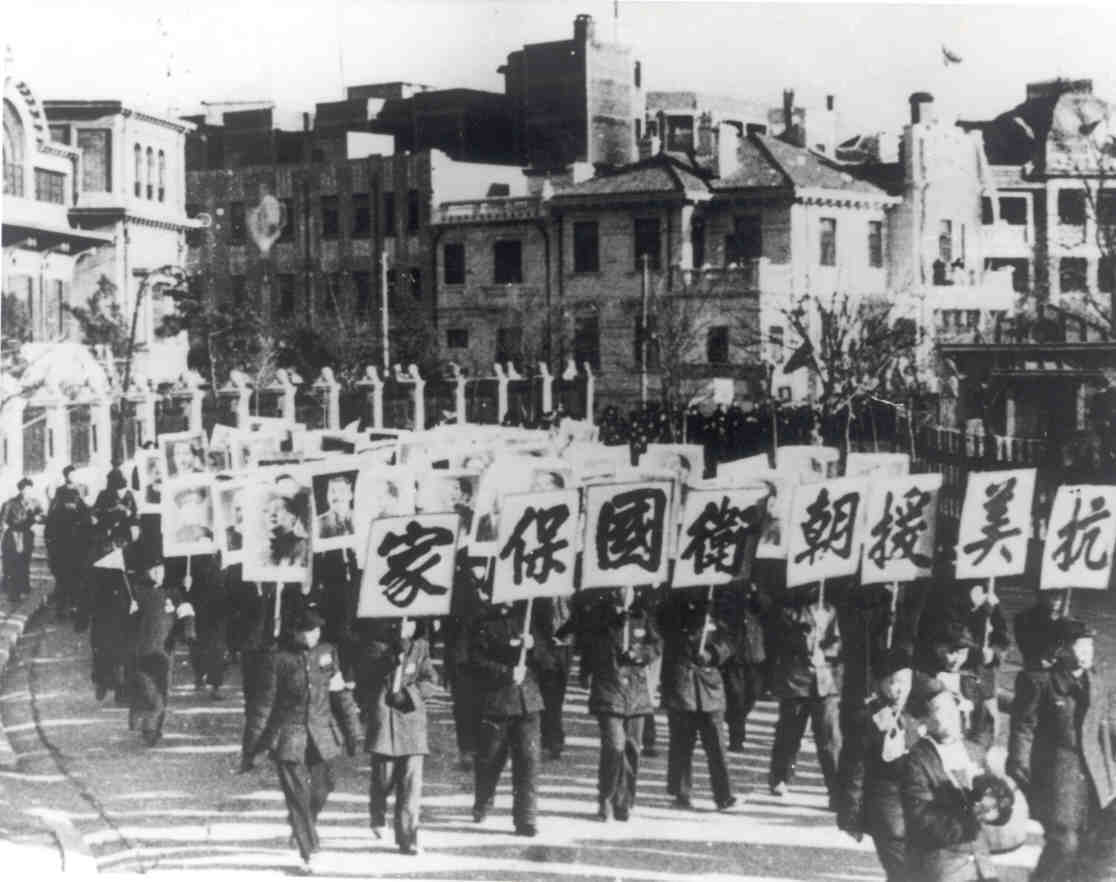
Street parade in Chinese city, 1950, the slogans held in people's hands mean: Resist US Aggression and Aid Korea, Defend the Homeland
Looking back at the Korean War, China spent enormous human, material and
financial resources,but gained nothing in return. While arms dealer Stalin was
gleefully counting his money, the Chinese people shed blood and sweat in Korea
without receiving anything in return, yet they claimed to have achieved a
significant victory. It is truly a case of being duped and still helping the
others count their money. China was first deceived by military adventurist Kim
Il-sung, and then betrayed by the cunning Stalin.
What is most unexpected is that China paid a heavy price to support Kim Il-sung,
who turned out to be an ungrateful fellow. In 1958, immediately after the
withdrawal of the Chinese People's Volunteers Army, Kim Il-sung purged the "Yan'an
faction" in North Korea, cleansing and killing military officers with ties to
Beijing (including the three Chinese PLA divisions which were given to Kim
Il-sung for free). Even the martyrs' cemetery of the Chinese People's Volunteers
in North Korea was destroyed during the Cultural Revolution period in 1967
(later restored). Nowadays, it is difficult to find any materials about the
Chinese People's Volunteers in North Korea's war memorials. North Korean
textbooks only depict Kim Il-sung as the commander who miraculously defeated the
U.S. military, while the Chinese People's Volunteers are merely mentioned in
passing.
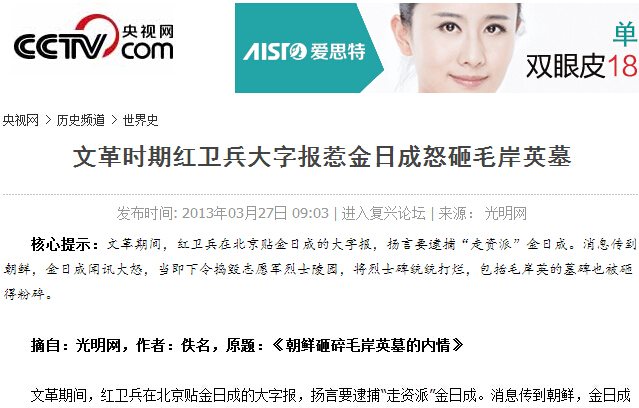
The picture above is a screenshot of a report by China Central Television (CCTV). The title is: During the Cultural Revolution, Red Guards provoked Kim Il Sung to smash Mao Anying's tomb in anger.
After the Kim family massacred the opposition, they established hereditary rule
in North Korea. The people have been starving, yet they don't care and instead
use China's aid to continually cause trouble at China's doorstep. Their actions
have become increasingly brazen, leading all the way to nuclear explosions, all
under the guise of "developing the universe". China now can only admit its
misfortune. Initially thinking we were raising a watchdog, and ended up with
raising a thankless wolf. If we had known this, we should have let the Americans
wipe out Kim of North Korea, and it would have been much easier to live next to
South Korea.
The current brutish behavior of North Korea actually stems from our erroneous
decisions. Personally, I believe the decision to completely withdraw the Chinese
People's Volunteers from Korea in 1958 was a mistake. As long as American troops
remain stationed in South Korea, there is a legitimate reason for Chinese
volunteers to be stationed in North Korea. It should be noted that the armistice
agreement at Panmunjom is just a simple ceasefire agreement, and theoretically,
the Korean War has not officially ended. If China had kept tens of thousands
elite troops stationed in North Korea, the Kim family would never have been so
arrogant later on.
In the list of martyrs from the Chinese People's Volunteers Army, the most
notable name is Mao Anying, Chairman Mao's eldest son. He served as a
confidential secretary and Russian translator to the commander-in-chief of the
Volunteers Army, Marshal Peng Dehuai. In theory, the army headquarters were
relatively safe, but accidents will happen. On November 25, 1950, at around 10
a.m., he died unexpectedly due to a gasoline bomb dropped by an enemy bomber.
According to Yang Di's 1998 memoir "Years at the Headquarters of the Volunteers
Army", Mao Anying's unfortunate death was caused by frying a bowl of egg fried
rice. According to discipline, cooking and other fire and smoke causing
activities were strictly prohibited during the daytime when air raids were
frequent.
Comrade Yang Di was the deputy director of the operations department of the
Volunteer Army at the time. He witnessed the whole process of Mao Anying's
death. The original text of his memoir is as follows, "When I passed by Marshal
Peng's office, I saw smoke coming out of the chimney and went inside to take a
look. There were three people in the room frying rice with eggs. These eggs were
sent the day before by Lieutenant General Park Yoo-yul, who was appointed as the
vice political commissar of the Volunteers Army by the Supreme Command of the
Korean People's Army. There were only about 10 eggs in a small basket, which was
extremely rare in Korea at that time. Marshal Peng had already eaten dinner, but
had not had a chance to eat the eggs yet. I only knew Comrade Cheng Pu among the
three people. The other two comrades were Peng's Russian translator and a staff
member who had just been transferred from the northwest, whose names I did not
know. I asked Cheng Pu, 'Old Cheng, how dare you use the eggs sent to Marshal
Peng to fry rice? Quickly put out the fire.' Cheng Pu said, 'How could I dare?
It was the translator comrade who was frying the rice.'"
Mao Anying has always used a pseudonym in the Volunteer Army, and only a few
people know his real identity. On that day, Yang Di and other personnel at the
headquarters did not know that the person who had died was Mao Zedong's son.
According to U.S. sources, the pilot who dropped the bomb on that day was
Lieutenant G.B. Lipawsky, a Polish-born pilot in the South African Air Force.
This air raid was an accidental coincidence, and it was also a major event that
turned the Mao family upside down. Mao Anying, Chairman Mao’s only son with a
sound mind, who was supposed to carry on his family name, died in this way. If
Mao Zedong had known this earlier, I wonder if he would have still sent troops
to Korea in defiance of the objections.
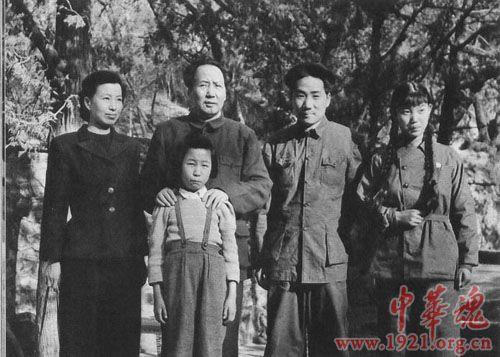
In April 1949, Mao Zedong, Mao Anying, Liu Siqi, his wife, Li Na, and Jiang Qing were in Xiangshan, Beijing
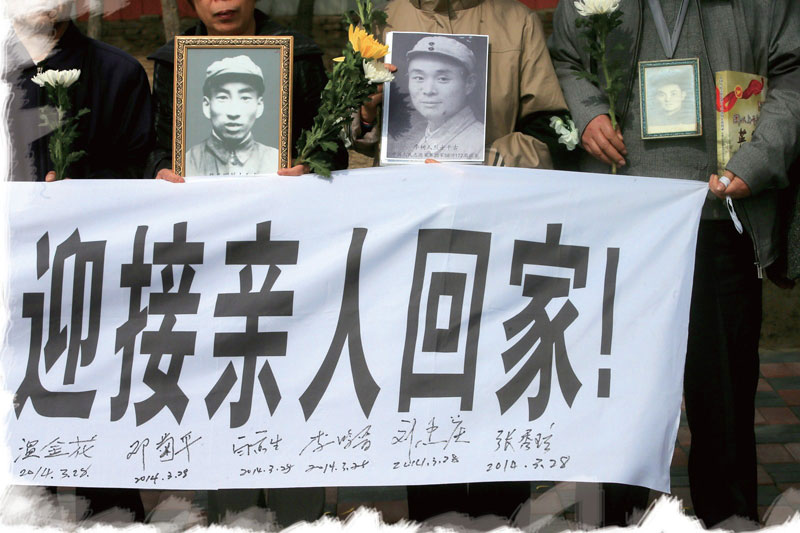
In March 2014, the ashes of the Chinese People’s Volunteers from Chongqing who died in the Korean War returned to China. The Chinese text of the banner means: welcome loved ones home.
Without further ado, a brief summary of the Korean War, that is, Chairman Mao
provided the troops and Stalin provided the guns, helping Kim Il-sung climbed
out of the Yalu River and secured his rule in North Korea, which has continued
through his son Kim Jong-il and grandson Kim Jong-un. Until today, Kim Jong-un
has been firing large fireworks near the Chinese border from time to time,
validating his presence, and reminding Beijing to provide aid continually. There
is nothing much China can do but to take the hard cheese.
If we must say that the Korean War benefited the Chinese people, it would be
that Chairman Mao’s son was left in Korea forever by a bowl of egg fried rice.
Otherwise, China should have continued to have the surname of Mao, just like
North Korea still has the surname of Kim.
This is a simple personal opinion. Appreciate corrections and
brickbats.
Lao Yang,
2015/4/20 first draft,
2021/10/5 revised in Changsha
Follow Lao Yang at:
1, Yang Fei Works: www.999kg.com
2, Telegram@feiyang17
3, Email:starrytibet@gmail.com
4, Medium@starrytibet
5, Twitter@feiyang17
6, Facebook@yangfei999999@hotmail.com
I insist on independent writing, do not do commercial advertising, do not accept
conditional sponsorship, and do not join official literary organisations. But
writers also need to make a living. If you like my work, you can buy me a coffee
through Wechat@yangfei789288, Alipay@13974850714, and PayPal@feiyang17. Thanks
for your support.